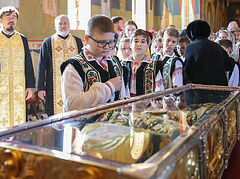Iași, Iași County, Romania, June 10, 2024
2024 marks the 400th anniversary of the birth of the Holy Hierarch Dosoftei of Iași, a beloved saint of the Romanian Orthodox Church.
The Archdiocese of Iași is holding commemorative events in his honor throughout the year.
St. Dosoftei was discussed during the recent symposium, “Explorations in the Romanian and European Biblical Tradition,” in recognition of his contributions to Romanian culture. Additionally, the liturgical program of the recent Byzantine Music Festival in Iași included a Vigil in honor of St. Dosoftei, reports the Basilica News Agency.
The service featured several compositions inspired by the Holy Hierarch’s Psalter in Verse sung by the Patriarchal Cathedral’s Tronos Psaltic Group.
The hierarch, who lived between 1624-1693, was the first national poet and versifier of the Psalter in the entire Eastern Orthodox space, the first translator of universal dramatic literature and historical literature into Romanian, as well as the first translator of liturgical books in Moldova.
In honor of the 400th anniversary of his birth, the Archdiocese of Iași is preparing to publish a critical edition of St. Dosoftei’s Psalter in Verse.
***
 From the Vigil Service in honor of St. Dosoftei. Photo: basilica.ro
From the Vigil Service in honor of St. Dosoftei. Photo: basilica.ro
St. Dosoftei was born in Suceava in 1624, receiving the name Dimitrie in Holy Baptism, because he was born near the October feast of the Great Martyr Demetrios of Thessaloniki.
The young Dimitri learned to read and write from the most famous teachers in Moldova and at the school of the Holy Dormition Monastery in Lvov. He was gifted by God with a special intelligence and studied the Scriptures and Patristic writings with great zeal. He also learned to speak and write in Greek, Latin, Slavonic, Polish, and Ukrainian, and translated many ecclesiastical texts into Romanian.
He also learned the spiritual works of prayer, obedience, humility, and asceticism at Probota Monastery, where he received the angelic tonsure in 1649 with the name of Dosoftei. Increasing in love and wisdom, he became a spiritual father and the abbot at Probota, guiding his monks to the love of God and His Holy Scripture.
Due to his prestige as both a learned and virtuous man, he was called to the episcopal ministry, and in 1658, he was consecrated Bishop of Huşi. A year later, he moved to the See of Roman, and in 1671, he was elected Metropolitan of Moldova, where he amazed everyone with his gentleness, humility, wisdom, and kindness.
St. Dosoftei ably led his Metropolis during times of upheaval, and continued translating and printing holy texts in Romanian. The first printed works were his Psalter in Verse and the Akathist to the Mother of God. He also reviewed the Romanian translation of the Old Testament, that was then included in the Romanian Bible beginning in 1688.
In fall of 1673, he was sent into exile in Poland because of his anti-Ottoman convictions, and was briefly replaced as Metropolitan, before returning the following year. He continued his very fruitful translation and publishing work. He also wrote about a number of saints whom he knew personally.
In 1686, St. Dosoftei was taken hostage by retreating Poles together with the Metropolis’ treasury and the relics of St. John the New and spent his last years in exile, where he continued his scholarly work.
As a faithful and sacrificial pastor, the holy hierarch endured the hardships and deprivations with dignity, caring for his Orthodox community in Poland. The holiness of his life shone not only on his spiritual children, but even King Jan Sobieski often came to participate in the services celebrated by St. Dosoftei.
Despite the pressures placed upon him, St. Dosoftei refused to convert to Uniatism and remained Orthodox until his passing into eternity on December 13, 1693. From the testimonies of the monks who accompanied him in exile, we learn that the saint knew the time of his calling to eternity by the Lord. The gentle hierarch Dosoftei was buried at the Nativity of the Lord Church in Zhovkva, today in Ukraine.
Suffering trials and many troubles in this transient life, St. Dosoftei of Moldova remains through the ages a theologian for the whole of the Orthodox Church, a hierarch with a holy life, and an unmatched teacher of the true faith in the language of his people. Enlightened by the grace of the Holy Spirit, he served the Church of the Savior Christ with love, humility, and wonderful deeds, and now prays in heaven for the salvation of our souls.
Follow OrthoChristian on Twitter, Vkontakte, Telegram, WhatsApp, MeWe, and Gab!




